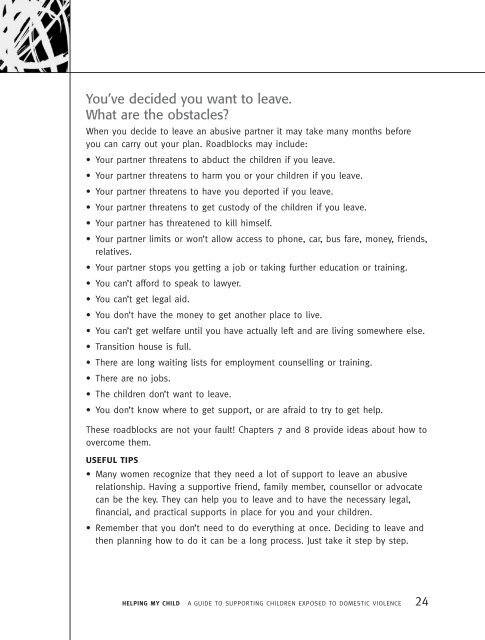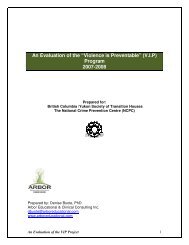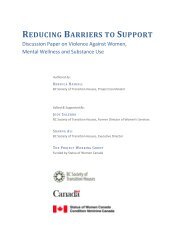a guide to supporting children exposed to domestic violence
a guide to supporting children exposed to domestic violence
a guide to supporting children exposed to domestic violence
Create successful ePaper yourself
Turn your PDF publications into a flip-book with our unique Google optimized e-Paper software.
You’ve decided you want <strong>to</strong> leave.<br />
What are the obstacles<br />
When you decide <strong>to</strong> leave an abusive partner it may take many months before<br />
you can carry out your plan. Roadblocks may include:<br />
• Your partner threatens <strong>to</strong> abduct the <strong>children</strong> if you leave.<br />
• Your partner threatens <strong>to</strong> harm you or your <strong>children</strong> if you leave.<br />
• Your partner threatens <strong>to</strong> have you deported if you leave.<br />
• Your partner threatens <strong>to</strong> get cus<strong>to</strong>dy of the <strong>children</strong> if you leave.<br />
• Your partner has threatened <strong>to</strong> kill himself.<br />
• Your partner limits or won’t allow access <strong>to</strong> phone, car, bus fare, money, friends,<br />
relatives.<br />
• Your partner s<strong>to</strong>ps you getting a job or taking further education or training.<br />
• You can’t afford <strong>to</strong> speak <strong>to</strong> lawyer.<br />
• You can’t get legal aid.<br />
• You don’t have the money <strong>to</strong> get another place <strong>to</strong> live.<br />
• You can’t get welfare until you have actually left and are living somewhere else.<br />
• Transition house is full.<br />
• There are long waiting lists for employment counselling or training.<br />
• There are no jobs.<br />
• The <strong>children</strong> don’t want <strong>to</strong> leave.<br />
• You don’t know where <strong>to</strong> get support, or are afraid <strong>to</strong> try <strong>to</strong> get help.<br />
These roadblocks are not your fault! Chapters 7 and 8 provide ideas about how <strong>to</strong><br />
overcome them.<br />
USEFUL TIPS<br />
• Many women recognize that they need a lot of support <strong>to</strong> leave an abusive<br />
relationship. Having a supportive friend, family member, counsellor or advocate<br />
can be the key. They can help you <strong>to</strong> leave and <strong>to</strong> have the necessary legal,<br />
financial, and practical supports in place for you and your <strong>children</strong>.<br />
• Remember that you don’t need <strong>to</strong> do everything at once. Deciding <strong>to</strong> leave and<br />
then planning how <strong>to</strong> do it can be a long process. Just take it step by step.<br />
HELPING MY CHILD A GUIDE TO SUPPORTING CHILDREN EXPOSED TO DOMESTIC VIOLENCE 24






